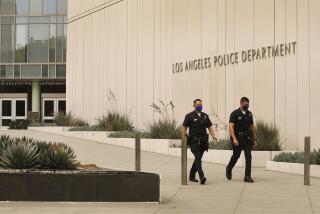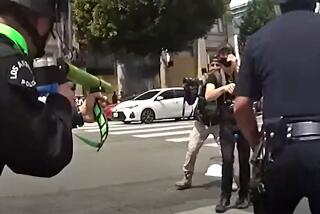7 Reporters Settle Suit Over LAPD
Attorneys with the American Civil Liberties Union said Thursday that they have reached a settlement with the city of Los Angeles on behalf of seven journalists who said they were assaulted by police officers while covering the 2000 Democratic National Convention.
According to the terms of the settlement, the city and the LAPD will recognize journalists’ right to cover public protests even if there is a declaration of unlawful assembly and an order to disperse is issued.
The city also agreed to assign a press liaison to such events and work with press organizations to set up designated areas from which journalists can observe them.
The agreement includes a $60,000 settlement for the journalists. But the case “was not about money,” said Peter Eliasberg, attorney for the ACLU. “It has always been the clients’ goal to get change in LAPD policy.”
LAPD spokesman Lt. Horace Frank said the settlement includes “nothing the department hasn’t done in the past.”
“We have always recognized that the news media has a right, without interfering with police operations, to cover events that may result in the declaration of an unlawful assembly and an order to disperse,” he said.
The lawsuit in federal district court was filed on behalf of Al Crespo, a freelance photojournalist; David Horowitz, a consumer reporter; Greg Rothschild, a freelance audio engineer; Kevin Graf, a television cameraman; Jeffrey Kleinman, a freelance cameraman; Rebeka Rodriguez, an alternative-media journalist; and Ronald DeVeaux, a freelance cameraman. The firm Milbank, Tweed, Hadley & McCloy served as pro bono co-counsel on the case.
The seven were shot with rubber bullets or clubbed with batons when police attempted to disperse a crowd at the protest they were covering on Aug. 14, 2000, outside Staples Center, according to the ACLU. Rodriguez suffered a broken shoulder.
More to Read
Get the L.A. Times Politics newsletter
Deeply reported insights into legislation, politics and policy from Sacramento, Washington and beyond. In your inbox three times per week.
You may occasionally receive promotional content from the Los Angeles Times.










